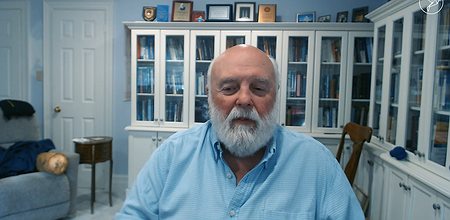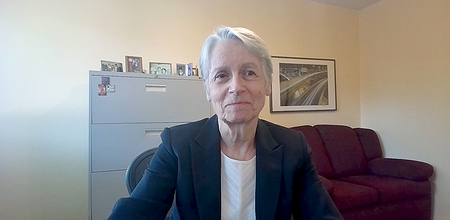- Identify the key traits of narcissists and the dynamics that bind vulnerable clients to them
- Understand the psychological impact of narcissistic abuse on individuals
- Apply therapeutic strategies to support the recovery and empowerment of clients
- Recognize trauma responses and support post-abuse identity reconstruction
Untangling the Web: Helping Clients Recover from Narcissistic Abuse
Dr. Patti Ashley, Psychologist
Master evidence-based strategies to help clients heal from narcissistic abuse through an integrated trauma-informed, attachment-based approach
Excerpt:
Introductory price until september 19
- 3h of continuing education
- 15 lessons that last from 5 to 15 minutes each
- 1 certificate of achievement
- 1 PowerPoint
- 1 bibliography
- 1 course evaluation
- 4 months access - automatically extended until you complete the course
- 7-day money back guarantee
Overview
Narcissistic abuse leaves enduring psychological wounds. Gaslighting, manipulation, intermittent reinforcement, and emotional invalidation often generate complex trauma responses—chronic self-doubt, anxiety, depression, and disruptions in identity and relational functioning.
This advanced clinical training offers mental health professionals a comprehensive framework for understanding and treating survivors of narcissistic abuse. It highlights the distinctive dynamics of this form of trauma, situates it within attachment and developmental theory, and examines its impact on self-worth, regulation, and interpersonal bonds.
Grounded in contemporary trauma science, you will:
- Refine your clinical eye to detect subtle patterns of narcissistic abuse and evaluate their effects on identity formation, attachment, and nervous system regulation.
- Strengthen your treatment framework to distinguish narcissistic abuse from other relational traumas and adapt interventions accordingly.
- Apply evidence-based strategies for trauma processing, somatic stabilization, and identity reconstruction.
- Integrate focused therapeutic tools to work with shame, restore boundaries, and support authentic selfhood.
Drawing on four decades of clinical expertise, Dr. Patti Ashley provides a nuanced, shame-informed methodology that addresses not only symptoms but the core psychological injuries inflicted by narcissistic abuse. By the end of this training, you will be equipped with advanced assessment tools, intervention protocols, and a clinically grounded roadmap to guide clients from crisis toward lasting recovery and integration.
About the expert

Dr. Patti Ashley, PhD, LPC is a renowned psychologist and trauma specialist with over 40 years of clinical experience treating complex trauma and narcissistic abuse. As founder of Authenticity Architects, she pioneered innovative approaches integrating neuroscience, attachment theory, and developmental psychology.
Her groundbreaking work on shame-informed therapy has transformed treatment protocols for survivors of narcissistic abuse. Dr. Ashley holds a PhD in Psychology from the Union Institute and University, with additional specialization in developmental psychology and trauma treatment.
A respected researcher and author, she wrote the influential text "Shame-Informed Therapy: Treatment Strategies to Overcome Core Shame and Reconstruct the Authentic Self" (2020). Dr. Ashley regularly conducts advanced clinical trainings internationally, helping practitioners develop expertise in trauma-informed, attachment-based approaches to healing.
Her integrative treatment model combines:
- Neurobiological trauma processing
- Attachment-based interventions
- Somatic regulation techniques
- Identity reconstruction protocols
- Shame-informed therapeutic strategies
Learning objectives
Learning material
A theoretical course illustrated with clinical examples. This course is composed of videos of 5 to 15 minutes each. The PowerPoint of the course to download.
Syllabus
- PowerPoint
- 1. Introduction
-
Understanding Narcissism and Its Impact
- 2. Narcissistic Personality Disorder
- 3. Types of Narcissism
- 4. Factors Influencing the Attraction to a Narcissist Part I
- 5. Factors Influencing the Attraction to a Narcissist Part II
- 6. Impact of Early Shame
- 7. Sanctioned Mini-Trauma & Shame Narratives
- 8. The “Shame” Story (False Self)
- 9. Characteristics of Narcissistic Abuse
-
Healing and Recovery Tools
- 10. Ten Helpful Strategies for Healing Part I
- 11. Ten Helpful Strategies for Healing Part II
- 12. Writing a New Story
- 13. The Nervous System in Relation to the Polyvagal Theory
- 14. Activate the Right Brain
- 15. Conclusion
- Bibliography
CE Credits
Download a certificate of successful completion.
Audience
This course is intended for mental health professionals.
Registration
Ask a question
Do you have a question? Then email us at contact@asadis.net
Frequently asked questions
-
Is there an evaluation at the end of the course?
To validate the achievement of the learning objectives, a final evaluation in the form of true/false questions is required. It must be completed in order to obtain the certificate of completion.
In addition, an optional self-assessment is offered at the beginning and end of the course, allowing you to measure your progress on the targeted skills.
These evaluations are not graded and are intended primarily to support your professional reflection.
-
I have a disability. Can I receive specific support?
Yes! This training is offered as a pre-recorded video format, without subtitles. If you have a disability, we can provide an adapted alternative (technical assistance for viewing or individual supervision). For any request, please contact our disability coordinator at the following address: contact@asadis.net
-
How long do I have access to the course?
After your registration, the course is accessible anytime and from anywhere for 124 days. And if that’s not enough, we’ll automatically extend your access.
-
When does the course start?
That is entirely up to you! When you buy a course, you'll receive an access link that you can activate when you want.
-
Is there a student rate?
Yes there is! To learn more, email us at contact@asadis.net.
You may also be interested in:
Legal notice
The courses offered by ASADIS are accredited by different professional organisations. In addition, ASADIS is approved by the Canadian Psychological Association to offer continuing education for psychologists. ASADIS maintains responsibility for the program.
The CPA’s approval of an individual, group, or organization as a CE Sponsor or Provider is restricted to the activities described in the approved application or annual report form. The CPA’s approval does not extend to any other CE activity the Sponsor or Provider might offer. In granting its approval, the CPA assumes no legal or financial obligations to Sponsors, Providers, or to those individuals who might participate in a Sponsor or Provider’s CE activities or programs. Further, responsibility for the content, provision, and delivery of any CE activity approved by the CPA remains that of the CE Sponsor or Provider. The CPA disclaims all legal liability associated with the content, provision, and delivery of the approved CE activity.





